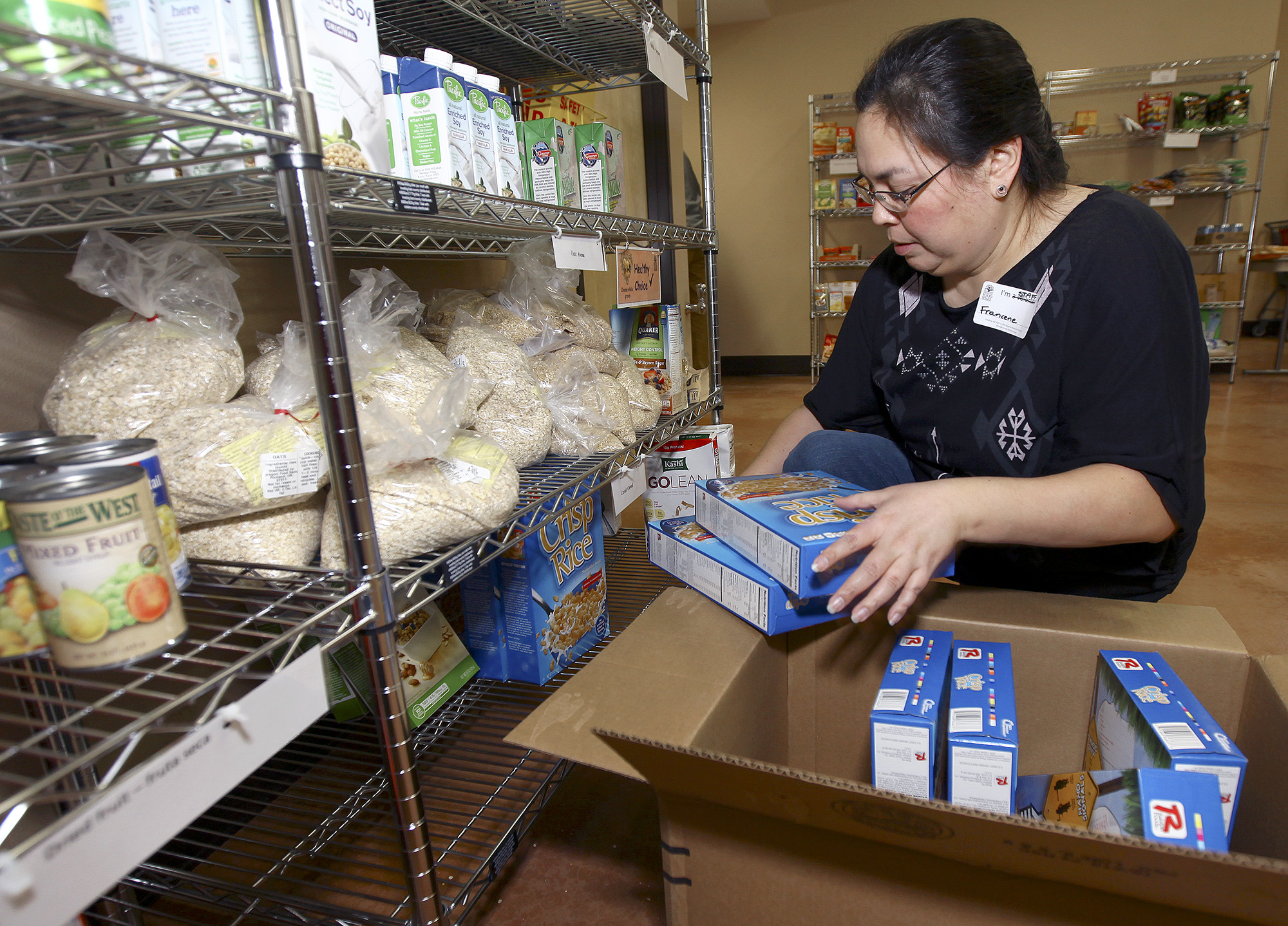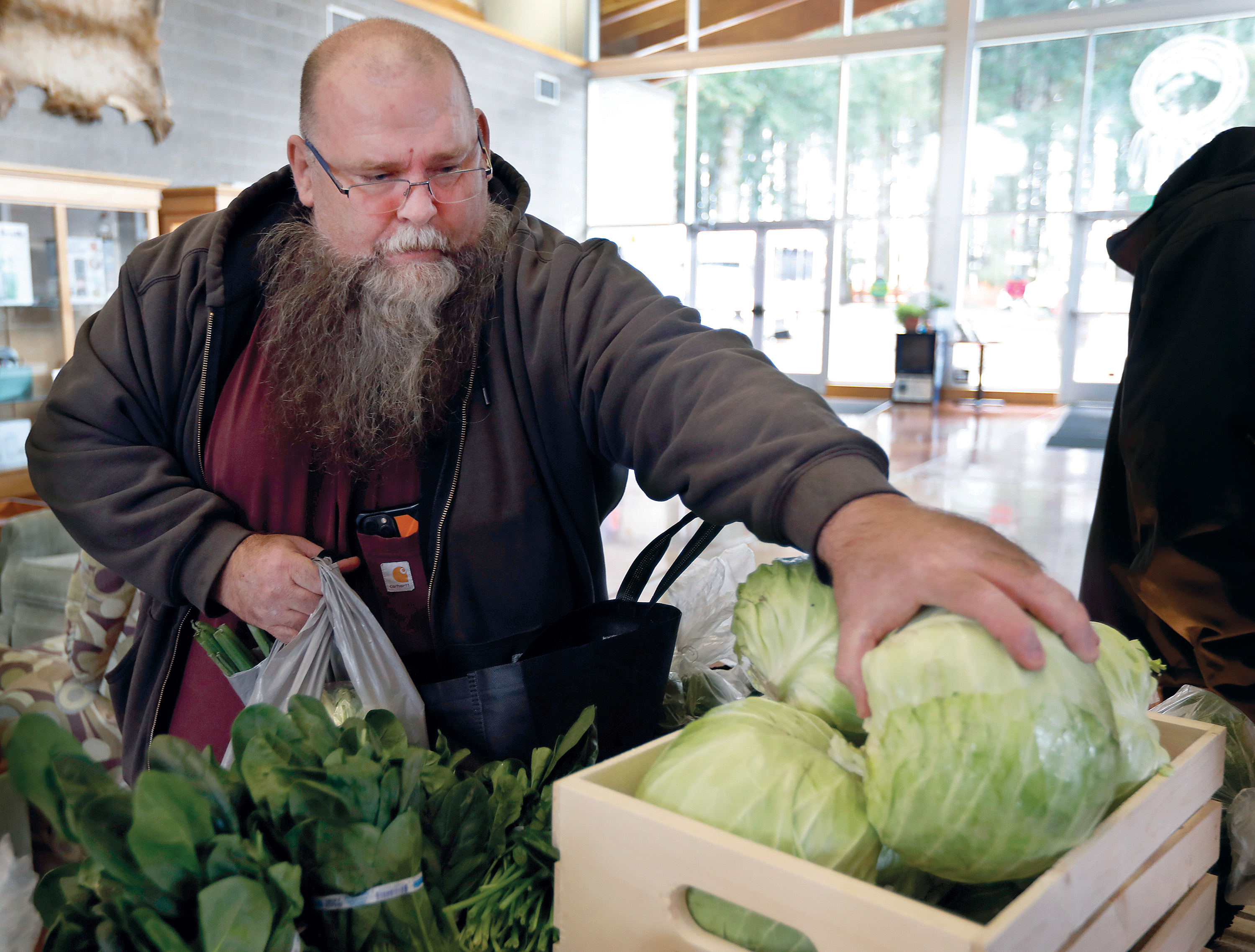Health & Education
Healthy Food Box distribution may end next year due to federal cuts

By Katherine Warren and Nicole Montesano
Smoke Signals staff
Cuts to the U.S. Department of Agriculture funding by the Trump Administration have thus far resulted in a cancellation of a grant that the Tribe uses for its monthly Healthy Food Box distribution.
Tribal Communications Director Sara Thompson said the Tribe is continuing to distribute the boxes using the remainder of its 2024 funding from the USDA.
“While the 2025 USDA funding has been terminated, we are pursuing every avenue possible to keep the program moving forward,” she said. “We will keep the membership updated on any future changes.”
Nutrition Program Manager Kristy Lawson said the loss is not expected to affect the recently added weekly produce market at the Elders Activity Center, as it is funded through the Nutrition Department budget and proceeds from the produce sales, Lawson said.
The weekly produce market is open every Friday, unless other events interfere with it, from 11 a.m. to 12:15 p.m. for Elders, then 12:15 to 1 p.m. for everyone.

Tribal Elder Wid Thompson picks a head of cabbage while shopping during the produce market at the Elders Activity Center Friday, March 28. Tribal Nutrition Program Manager Kristy Lawson recently started the cost-to-you market that takes place every Friday, except for weeks that other events interfere with the market. It’s open from 11 a.m. to 12:15 p.m. for Elders only, then from 12:15 to 1 p.m., shopping is open to all. Thompson traveled from Aumsville to shop at the market. (Photos by Michelle Alaimo)
Local food bank organizers said USDA funding losses are affecting them as well. Demand is up, while funding is being cut, they said.
Grand Ronde Food Bank (iskam mǝkʰmǝk-haws) Coordinator Francene Ambrose said, “Nineteen semi-truck loads (from the USDA) were coming to Oregon in April loaded with frozen meat, eggs, milk and produce. They were cancelled last Thursday morning.”
That means no federal food deliveries for April, Ambrose said.
“We get most of our food from the Oregon Food Bank and now they have had cuts,” she said. “This means that we have lost our core stuff for the pantry. We do get donations from retail stores directly for our pantry from Safeway, WinCo and Dollar General. We do get our bread from Dave’s Killer Bread out of Clackamas as well as Bimbo Bread Company. Oregon Food Bank has been partners with Fred Meyer, Safeway, Costco, Walmart and more. However, the ordering for those places has been going down.”
Stores are trying to cut back on waste, Ambrose said, which also affects donations.
“When it comes to them ordering for the shelves, they base it off their online orders and not on what is actually getting sold in the stores themselves as well,” she said. “All pantries are seeing decreasing options overall across the board and it doesn’t look like it’s going to get better anytime soon.”
The food bank provides mobile delivery on Wednesday, and clients can also go into the lobby to pick up produce and other items. Every Friday, clients can pick up food boxes at the food bank.
Food banks in nearby Willamina and Sheridan, where many Tribal members live, have also been affected by the USDA funding cuts.
Grand Sheramina Food Bank Manager Judy Adams said she received a letter from Yamhill Community Action Program, saying that five semi-trucks filled with food were recently canceled due to federal funding cuts. Adams said the food had already been ordered when the funding was canceled. The loss affected YCAP’s ability to supply local food pantries.
Adams said Grand Sheramina Food Bank receives 4,000 pounds of food every week from YCAP, and she has already seen a decrease.
“We receive an order form monthly and that used to be six pages long, and now it’s been cut to one and three-quarter pages,” Adams said.
At the same time, the number of people coming in for emergency food has increased significantly.
The food bank has also lost some of its other resources. Franz Bread Company, located in Portland, had been the main source of bread donation, Adams said, but the bakery burned down six months ago. iskam mǝkʰmǝk-haws has been offering extra bread to Adams to help compensate.
Adams said her program’s warehouse, formerly filled with food donations, is now about one-third full.
“These are some very scary times and it doesn’t seem to be getting better anytime soon,” Adams said.
Willamina Food Bank, which primarily provides produce and bread, is part of the Marion-Polk Food Share Program. Manager Katie Kendall said currently, she receives 20 to 32 banana boxes full of produce and bread weekly from Marion-Polk Food Share but was recently informed that the program is seeing a 25% funding cut.
Kendall said demand has increased, from 25 clients per week to 60 to 65, and she expects it continue growing.
Schools may also be affected, however, Willamina School District Superintendent Mike Gass said things are still moving forward.
“We will be offering our summer lunch program still this summer in the two locations at the Willamina City Park as well as at Tribal housing in Grand Ronde.”
Gass said he is watching news reports closely and the meals the district offers to students will still be provided.
“They may see some changes in the items that are available,” Gass said. “If I wouldn’t eat them, the students won’t either.”
Gass explained that he regularly eats in the cafeteria and only had positive things to say about district Nutrition Services Director Lynne Shore.
Shore recently was in Washington D.C. testifying to Congress about the cancellation of the federally funded Farm to School grant, which provided funds for purchasing food grown or processed locally within 400 miles of the school district, she said.
The district received the grant in March 2023 and used it to help offset the cost of milk.
In addition, she said, the district has a state-funded Farm to School grant that she uses for purchasing locally made food, such as pizzas from Carlton and tortillas from Eugene.
Shore said it’s unclear how school lunch programs will be affected long-term.
“It will come down to how the federal budget proposal goes,” she said.
Shore said there is also currently a bill before the Oregon Legislature, House Bill 3435, that would make school meals free to all students.
The bill is currently in the House Joint Committee on Ways and Means, which means it is under review and has not yet been sent to the full legislative body for approval.
How to help food banks
Money is one of the most helpful items to donate to local food banks, Grand Sheramina Food Bank Manager Judy Adams said, because “I could get a lot more food than they could with the same amount.”
However, food items are also welcomed, according to Adams and other food bank managers. Highest on the list are proteins such as canned meat and peanut butter, protein bars and protein drinks.
Easily heated meals such as chili and microwavable macaroni and cheese, carbohydrates such as rice, frozen items and jam or jelly to go with peanut butter, are also in high demand.
Contact information for local food banks is as follows:
iskam mǝkʰmǝk-haws Food Bank Coordinator Francene Ambrose: 503-879-1322.
Grand Sheramina Food Bank Manager Judy Adams: 503-313-5702 or 503-843-3133.
Willamina Food Bank Manager Katie Kendall: 971-241-3173. Smaller donations may be left in the Little Free Pantry outside, at 340 B St. For large donations, call Kendall to coordinate delivery.
